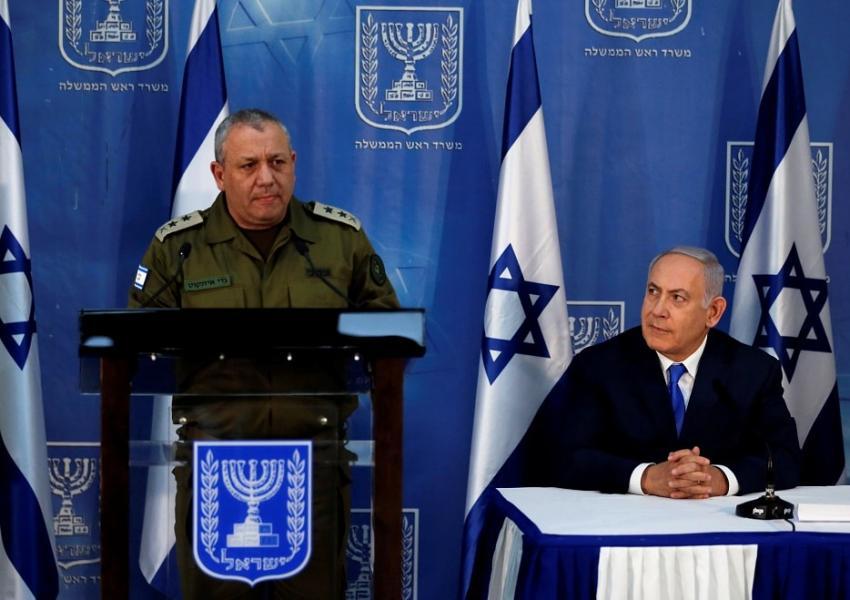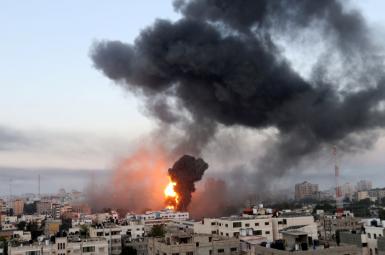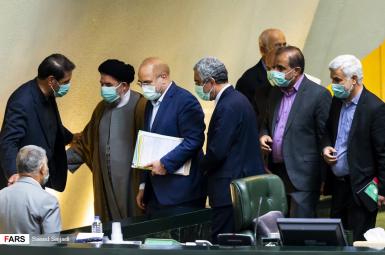
Numerous Israeli Attacks on Iranian Targets in Syria; Silence of the Generals
General Gadi Eizenkot, who is not usually interested in interviews, just handed the desk of the Commander-in-Chief of the Israel Defense Forces to Aviv Kochavi. Right before that, in an unexpected move on January 11, he said in an interview with New York Times that Israel, in the last two years, had struck thousands of Iranian targets in Syria without claiming responsibility or taking credit.
According to this Israeli general, the Israeli government issued the order for these attacks in January 2018 and the air force has dropped around 2000 bombs, only in 2018, on Iranian forces in Syria.
General Eizenkot revealed a thousand times of attacks against Iranian forces. What’s more, a day after this interview, Benjamin Netanyahu, Israel’s prime minister, confirmed that the army had targeted Iranian and Hezbollah forces in Syria hundreds of times. Israeli officials, whether inside the government or the army, usually neither confirm nor deny the reports of such attacks.
Deliberate Equivocation
Previously, especially after Israel’s attack against Syria’s nuclear center in 2007, many experts assessed that Israel did not want to reveal the attack or take responsibility for it. Israelis appeared to believe that without conceding to the attack, Assad’s regime would pretend that nothing had happened in a face-saving gesture, and thus a retaliation would not be necessary.
This approach would satisfy Israel’s goals enough. Therefore, Israelis applied the same tactics to other attacks, for example on Hezbollah’s ‘weapon caravans’ or Iranian bases and troops in Syria. More importantly, the constant engagement of Iranian troops in fighting anti-Assad forces gave Israel the opportunity to conduct its efficient attacks without being involved in the exhausting Syrian civil war. Moreover, the Israelis’ equivocation in the occurrence of these operations limited the media’s attention and paved the way for them to continue their regular attacks for months.
Exceptional Cases
There have been cases when Israel had to disclose the operations. For instance, Israel confirmed that an F-16 Falcon belonged to Israel air force was shot down by the Syrian army in February 2018.
In September 2018 when a Russian military aircraft with 14 people on board was shot down, Russia blamed Israel. However, Israel denied the responsibility and blamed the incompetence of Syrian air defense forces. After reviewing radar data of the incident, Russian army later concluded that an Israeli F-16 was hiding behind the Russian aircraft to avoid Syrian defense system.
It is reported that Israel made some changes in how such operations are done to avoid similar incidents.
Confirming the Attacks on Iranians
The establishment of an Iranian front near Israeli borders is considered a great threat by Israel. According to Netanyahu, this is the red line for Israel and they would fight it seriously.
General Eizenkot says that the decision to start expansive operations on Iranian forces was due to a shift in Iran’s strategy in Syria which became evident two and a half years ago. This meant that the Islamic Republic of Iran attempted to expand its influence in Syria with “forming an army of one hundred thousand Shia militants recruited from Iran, Pakistan, Afghanistan, and Iraq. This army had created intelligence centers at every Syrian air force base.”
General Eizenkot calls this move the “strategic error” by Qassim Suleimani, the head of IRGC Quds forces. Thirty missiles were shot towards Israel in May 2018 which was responded by Israel’s attacks on tens of Iranian and Syrian bases.
After these attacks, Israel rejected Russia’s proposal that they would secure Iranian forces stay away from the 100-kilometer radius of the Golan borders. Israel insisted on a complete withdrawal of Iranians from Syria in addition to four other conditions: removal of all long-range missiles from Syria; ending the production of missiles; removal of missile defense systems; closure of the border passages between Syria-Lebanon and Syria- Iraq to prevent weapons smuggling.
Why Confirming Now?
The confirmation of the operations and regular attacks on Iranian troops and their proxy militias is believed to be linked with the upcoming election campaign in Israel and the withdrawal of the Americans from Syria. Israeli officials seem to understand the dire consequences of this withdrawal for their national security.
The disclosure of the attacks, nonetheless, could be related to the pressure campaign on the Islamic Republic in line with secretary Pompeo’s trips to the Middle East. In disclosing these attacks, the Israelis intend to show that Iranian leaders, IRGC generals, and Quds force commanders have been unable to do anything in response to these attacks despite their daily threats against Israel. This contradiction between what Iranians shout in public and what they really do is very damaging to their image for their base inside Iran and for their fans in the region.
Two Birds, One Stone?
It is hard to confirm that all these attacks were only targeted against Iranian troops. There is a possibility that Israel wants to damage Syrian bases and infrastructure as much as possible taking this opportunity. This is aimed to prevent Assad or any other Syrian leaders from creating any threats against Israel for the coming next decades at least. In other words, Israel is hitting two birds with only one stone.
Israel’s Superiority
Israel has the advantage in terms of air and intelligence war and there is no force capable of confronting them: neither Syrians nor Iranians. In fact, the Islamic Republic of Iran lacks any winning card in Syria against Israel. They can’t fight Israel directly, so the commander of the Quds forces, Qassim Suleimani, has been silent about these crushing defeats in Syria.
Meanwhile, these attacks against Iranians, whether thousand times or hundred times, have definitely not been unnoticed by Russians. While they have had cold relations with Israelis since their aircraft was shot down, Russians have allowed the Israelis to keep on targeting Iranians.
Although Russians agree with Iranians on some issues about Syria, they want Iranians to leave Syria altogether and they are in line with Israel in this respect.
Four decades of Russian diplomacy towards the Islamic Republic indicates that Russians play the Iran card anywhere necessary to pursue their strategic and national interest at the expense of Iran.









